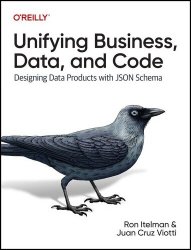Unifying Business, Data, and Code: Designing Data Products With JSON Schema
- Добавил: literator
- Дата: 2-02-2024, 19:49
- Комментариев: 0
 Название: Unifying Business, Data, and Code: Designing Data Products With JSON Schema
Название: Unifying Business, Data, and Code: Designing Data Products With JSON SchemaАвтор: Ron Itelman, Juan Cruz Viotti
Издательство: O’Reilly Media, Inc.
Год: 2024
Страниц: 300
Язык: английский
Формат: epub (true)
Размер: 10.8 MB
In the modern symphony of business, each section-from the technical to the managerial-must play in harmony. Authors Ron Itelman and Juan Cruz Viotti introduce a bold methodology to synchronize your business and technical teams, transforming them into a single, high-performing unit.
Misalignment between business and technical teams halts innovation. You'll learn how to transcend the root causes of project failure-the ambiguity, knowledge gaps, and blind spots that lead to wasted efforts.
The unifying methodology in this book will teach you these alignment tools and more:
• The four facets of data products: A simple blueprint that encapsulates data and business logic helps eliminate the most common causes of wasted time and misunderstanding
• The concept compass: An easy way to identify the biggest sources of misalignment
• Success spectrums: Define the required knowledge and road map your team needs to achieve success
• JSON Schema: Leverage JSON and JSON Schema to technically implement the strategy at scale, including extending JSON Schema with custom keywords, understanding JSON Schema annotations, and hosting your own schema registry
• Data hygiene: Learn how to design high-quality datasets aligned with creating real business value, and protect your organization from the most common sources of pain
The axiom “Your AI Is Only as Good as Your Data” serves as a critical pillar of this book, highlighting the inextricable link between data quality and AI efficacy. Our framework builds on the groundbreaking contributions of seminal figures in the field—Claude Shannon’s information theory, Alan Turing’s computational models, and Shane Legg and Marcus Hutter’s advancements in reinforcement learning. Their collective insights merge seamlessly into our comprehensive methodology, which we will explore in detail in Chapter 15.
Data scientists leverage rigorous methodologies and empirical reasoning to dissect complex challenges and represent them in a structured format. This facilitates the deployment of machine learning algorithms and the construction of predictive models. In this book, we introduce the concept of designing intelligence—a synthesized set of best practices aimed to equip both technical experts and managerial staff with a robust skill set in data-centric problem solving.
No matter what industry you work in, JSON is likely already used by your organization and that you have at least heard about it. JSON (jаvascript Object Notation) is a standard and language-agnostic data interchange format inspired by a subset of the jаvascript programming language. JSON is easy to learn. Its simplicity, both in terms of data types and grammar, was a significant contributing factor to its popularity. The specification that defines JSON states: “Because it is so simple, it is not expected that the JSON grammar will ever change. This gives JSON, as a foundational notation, tremendous stability.” If you are working with data in some way, familiarity with JSON and its ecosystem is a powerful skill. At the time of writing, JSON is the lingua franca, or common tongue, of data. According to content delivery network (CDN) providers such as Akamai, a majority of HTTP requests on the internet consist of JSON documents.
Popular NoSQL and SQL databases, including PostgreSQL, MySQL, Oracle, MongoDB, and others, have first-class JSON support. Of course, JSON is natively supported by popular data processing software such as Apache Hive, Apache Spark, and GoogleSQL. Due to the dominance of JSON as a data format, JSON parsers exist in virtually every popular programming language. According to research from Stanford University, JSON is so prevalent in the world of big data that big data applications often “spend 80%–90% of their time parsing JSON documents.” Stack Overflow found that questions about JSON are being asked at least three times more often than about other data formats used in the world of Data Science.
Contents:
Скачать Unifying Business, Data, and Code: Designing Data Products With JSON Schema
Внимание
Уважаемый посетитель, Вы зашли на сайт как незарегистрированный пользователь.
Мы рекомендуем Вам зарегистрироваться либо войти на сайт под своим именем.
Уважаемый посетитель, Вы зашли на сайт как незарегистрированный пользователь.
Мы рекомендуем Вам зарегистрироваться либо войти на сайт под своим именем.
Информация
Посетители, находящиеся в группе Гости, не могут оставлять комментарии к данной публикации.
Посетители, находящиеся в группе Гости, не могут оставлять комментарии к данной публикации.

